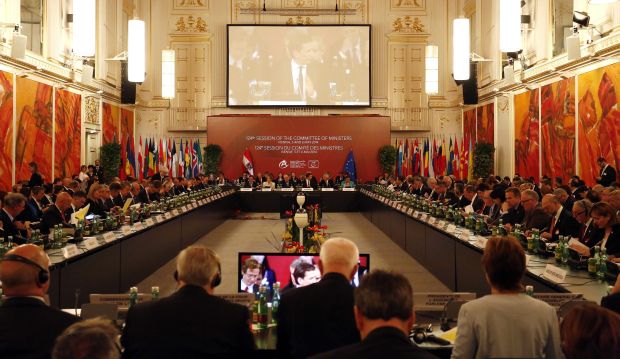
A general view of the 124th Session of the Committee of Ministers of the Council of Europe at the Hofburg in Vienna, Austria, on May 6, 2014. (EPA/DRAGAN TATIC)
Paris, AP—The Council of Europe is taking new steps to combat violence against women under a newly ratified convention that comes into force Friday.
Fourteen European states are committing themselves to better fight violence against women following the signature of the so-called “Istanbul Convention.”
The convention comes into force on Friday in 11 member states (Turkey, Albania, Italy, Montenegro, Bosnia and Herzegovina, Serbia, Austria, Andorra, Spain, Denmark) and will be joined by France, Sweden and Malta in November.
“Violence against women remains one of the most widespread human rights violations which take place every day in Europe”, said Nils Muiznieks, Council of Europe Commissioner for Human Rights, in a statement published this week.
The convention obliges participating governments to take measures to counter domestic violence, forced marriage, stalking and sexual violence.
At least 12 women are killed by gender-related violence in Europe every day, according to the Council of Europe. In 2013 domestic violence claimed the lives of 121 women in France, 134 in Italy and 143 in the United Kingdom, according to national statistics.
The convention also targets female genital mutilation, forced abortion and forced sterilization, sexual harassment, and crimes committed in the name of “honor.”
Signatories must “ensure that victims have access to services facilitating their recovery from violence” including “services such as legal and psychological counselling, financial assistance, housing, education, training and assistance in finding employment,” according to the convention. They must also “provide for the setting-up of appropriate, easily accessible shelters in sufficient numbers to provide safe accommodation for and to reach out pro-actively to victims, especially women and their children”.
Independent experts will monitor governments’ compliance with the convention.
Another 22 nations in the 47-member Council of Europe—the continent’s leading human rights body—have signed the convention but not yet ratified. Eleven have so far ignored it, including Russia.
